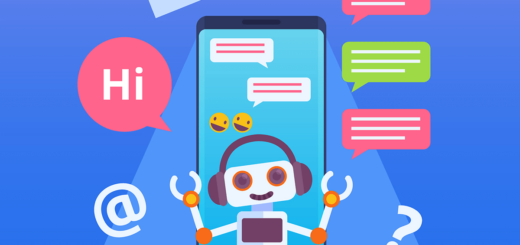The AI Revolution in Business: How Companies Are Leveraging Artificial Intelligence

Artificial Intelligence (AI) is no longer just an emerging technology; it has become a fundamental driver of business innovation. From automating routine tasks to making complex, data-driven decisions, AI is transforming industries at an unprecedented pace. Businesses across finance, healthcare, retail, and manufacturing are integrating AI-driven solutions to improve efficiency, enhance customer experiences, and gain competitive advantages.
As AI technologies continue to evolve, organizations are shifting their focus from experimentation to full-scale implementation. This article explores how businesses are leveraging AI today, the key industries benefiting from AI advancements, and the challenges that come with widespread adoption.
1. AI-Driven Automation: Enhancing Productivity and Efficiency
One of the biggest advantages of AI in business is its ability to automate repetitive and time-consuming tasks. Companies are increasingly adopting Robotic Process Automation (RPA), AI-powered chatbots, and predictive analytics to streamline operations.
- Robotic Process Automation (RPA): AI-powered bots are taking over repetitive back-office tasks such as data entry, invoice processing, and compliance monitoring. This reduces errors and allows employees to focus on higher-value tasks.
- AI-Powered Chatbots & Virtual Assistants: Businesses are integrating AI-driven chatbots into their customer service operations, providing 24/7 support with instant responses. Virtual assistants like Google Assistant, Alexa, and enterprise AI assistants are handling inquiries and managing business workflows.
- Predictive Analytics for Business Optimization: AI algorithms analyze vast amounts of data to identify trends and make accurate predictions. Retailers use AI to optimize inventory, financial institutions use it for fraud detection, and manufacturers use it for demand forecasting.
By automating repetitive processes, businesses are reducing operational costs and increasing efficiency, allowing employees to focus on innovation and strategy.
2. AI in Decision-Making: Data-Driven Business Strategies
AI is revolutionizing decision-making by providing businesses with deep insights and predictive analytics. Companies are using AI to analyze vast amounts of structured and unstructured data, uncovering trends that would be impossible for humans to detect manually.
- AI-Powered Business Intelligence (BI): Tools like IBM Watson, Google AI, and Microsoft Azure AI are helping businesses process massive datasets to extract actionable insights. AI-driven BI tools assist in market analysis, risk assessment, and financial forecasting.
- Sentiment Analysis for Customer Insights: AI-driven natural language processing (NLP) tools analyze social media, customer reviews, and support interactions to understand consumer sentiment and adjust business strategies accordingly.
- AI-Enabled Risk Management: AI models predict potential risks by analyzing historical data and market patterns. This is particularly valuable in finance, insurance, and supply chain management.
The ability to process and interpret vast amounts of data faster and more accurately than human analysts gives businesses a significant competitive edge.
3. AI in Customer Experience: Personalization and Engagement
AI is reshaping how businesses engage with customers, making interactions more personalized and efficient. Companies are leveraging AI-powered recommendation engines, voice assistants, and hyper-personalized marketing to enhance customer experiences.
- AI-Powered Personalization: Companies like Netflix, Amazon, and Spotify use AI to analyze user preferences and behaviors to provide tailored recommendations, increasing customer satisfaction and engagement.
- Conversational AI & Voice Assistants: With advancements in speech recognition and NLP, businesses are integrating voice assistants like Google Assistant, Alexa, and Siri into their services to improve accessibility and convenience.
- AI-Driven Advertising & Targeting: AI algorithms analyze customer data to create hyper-personalized marketing campaigns. Brands use AI-powered ad platforms to target users with relevant content, optimizing conversion rates and reducing marketing costs.
By leveraging AI for personalization, businesses are enhancing customer loyalty, increasing sales, and building stronger brand relationships.
4. AI in Key Industries: Transforming Business Operations
AI is impacting multiple industries, creating new opportunities for efficiency and innovation. Some of the most AI-driven sectors include:
Healthcare
- AI-powered diagnostics and imaging tools assist doctors in detecting diseases like cancer more accurately.
- AI-driven drug discovery accelerates research by analyzing biological data.
- Virtual health assistants improve patient engagement and treatment adherence.
Finance
- AI-powered fraud detection models identify suspicious transactions in real time.
- Algorithmic trading systems analyze market trends to optimize investment strategies.
- AI-driven robo-advisors offer personalized financial recommendations.
Retail & E-commerce
- AI-based inventory management predicts demand and prevents stock shortages.
- Automated customer service chatbots enhance user experience.
- AI-driven product recommendations increase sales and customer retention.
Manufacturing & Supply Chain
- AI-driven predictive maintenance reduces equipment downtime.
- Autonomous robots optimize warehouse management and order fulfillment.
- AI-powered supply chain analytics minimize disruptions and improve logistics efficiency.
As AI adoption grows across industries, businesses that embrace AI-driven solutions will outperform competitors and achieve long-term success.
5. Challenges and Ethical Considerations in AI Adoption
While AI presents enormous opportunities, businesses must also navigate several challenges:
- Bias and Fairness: AI models trained on biased datasets can reinforce discriminatory outcomes in hiring, lending, and law enforcement.
- Data Privacy and Security: With increasing reliance on AI, companies must ensure compliance with data protection regulations such as GDPR and CCPA.
- Integration with Existing Systems: Many businesses struggle to integrate AI with legacy IT infrastructure.
To fully harness AI’s potential, businesses must invest in ethical AI practices, secure AI governance frameworks, and ensure transparent decision-making.
Final Thoughts: The Future of AI in Business
AI is no longer just a tool—it is a strategic asset that is reshaping the global business landscape. From automation and predictive analytics to personalized customer experiences and risk management, AI is becoming indispensable for businesses aiming to scale and stay competitive.
As companies continue to refine AI-driven strategies, the key to success will be balancing innovation with responsible AI development. Businesses that invest in AI today will not only gain a competitive edge but will also help define the future of data-driven decision-making, customer engagement, and operational efficiency.
The question is no longer “Should businesses adopt AI?”—but rather, “How fast can they implement AI to stay ahead?”




